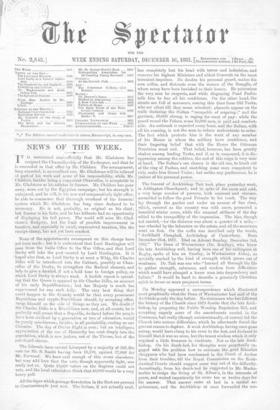On Monday appeared a correspondence which illustrated most graphically what
the Dean of Westminster had said of the Archbishop only the day before. No statesman who has followed the history of the Church since 1874 doubts that the late Arch- bishop, by proposing the Public Worship Regulation Bill, and accepting eagerly some of the amendments carried in the Commons, had really (though unintentionally, of course) led the Church into serious difficulties, which he afterwards found the gravest reason to deplore. A weak Archbishop, having once gone astray, would have clung to his error to the last, and declared to himself that it was no error, but the truest wisdom which it only required a little firmness to vindicate. Not so the late Arch- bishop. On his death-bed, his thoughts were perpetually en- gaged with the problem how to extricate the good Ritualist clergymen who had been condemned in the Court of Arches from their troubles, till the Royal Commission on the Eccle- siastical Courts should suggest some way out of the difficulty. Accordingly, from his death-bed ho suggested to Mr. Macko- nochie to resign the living of St. Alban's, in the interests of peace, and waited impatiently for some ten or twelve days for his answer. That answer came at last in a cordial ac- quiescence, and the Archbishop at once forwarded the cor- respondence to the Bishop of London, recommending Mr. Mackonochie to the Bishop's good offices ; and the result was the arrangement which we announced last week, and on which we have commented in another column. In other words, an Arch- bishop who had personally so little sympathy with Ritualism that he had at one time thought it his duty to suppress it by law, virtually admitted on his death-bed that he had erred, did all that was in his power,—and. at that time, of course, much was in his power,—to suspend for a time the operation of the obnoxious law, and so left to the Church the impressive legacy of a solemn and authoritative exhortation to his brethren to learn to tolerate the very men whom at one time he had been most anxious to put down.







































 Previous page
Previous page